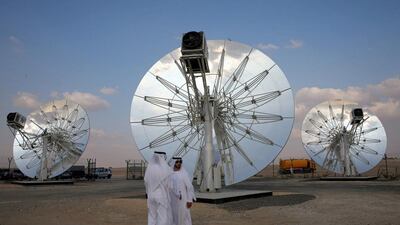Palestine is turning to renewables to counter unreliable energy imports and save millions of dollars as it implements a new renewable energy law.
Omar Kittaneh, Palestine’s minister of energy and natural resources, said at a Clean Energy Business Council event in Dubai yesterday that several initiatives were being released this year to bring on 30 megawatts of solar power, which will include the launch of solar power tenders next week.
These tenders will include 10 megawatt solar projects for each of its 11 governorates totalling 110 megawatts, to be added to the grid over the next four years.
There will also be about 35MW of solar capacity added to the grid under a net metering system, which is similar to the type of system deployed in Dubai’s Shams initiative.
A net metering agreement allows a consumer to generate power in line with the regulating authority where a power utility will provide credits rather than cash for electricity generated.
The 35MW will be divided, with businesses taking 25MW and residential and public sectors using the remaining 10MW. These systems will be eligible for soft loans provided from the US$50 million Palestine Solar Fund.
And while Palestine will feature a net metering system similar to Dubai's Shams, there is a key difference.
“No one else is doing net metering the way we are,” said Mr Kittaneh, adding that Palestine would provide credits for any excess electricity generated. This is unlike Dubai’s net metering system which places a cap on how much electricity can be generated through the net metering programme.
However, Palestine’s electricity situation is far different from that of the UAE.
The state only generates about 20 per cent of its own power needs, and the remaining 800MW is imported from Israel. This has also led Palestine to prepare two 50MW projects featuring solar photovoltaics (PV), the same technology deployed at Dubai’s Mohammed bin Rashid Al Maktoum Solar Park.
“The entire programme will save over US$90m,” said Mr Kittaneh. “We see [renewables] as not just a huge source of energy, but also as saving lives.”
lgraves@thenational.ae
Follow The National's Business section on Twitter

